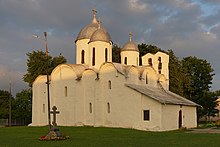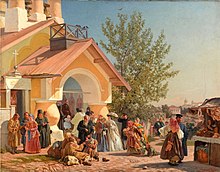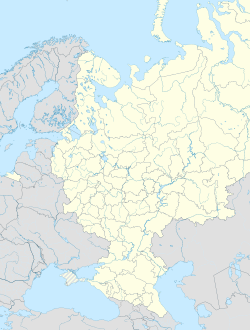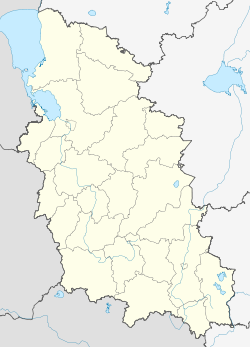Pskov
| city
Pskow / Pleskau, Pleskow
Псков
|
||||||||||||||||||||||||||||||||||||||||||
|
||||||||||||||||||||||||||||||||||||||||||
|
||||||||||||||||||||||||||||||||||||||||||
| List of cities in Russia | ||||||||||||||||||||||||||||||||||||||||||
Pskow ( Russian Псков , German historically also Pleskau , Pleskow , Estonian Pihkva , Latvian Pleskava ) is a city in northwestern Russia with 203,279 inhabitants (as of October 14, 2010), about 290 km southwest of Saint Petersburg and near the border with Estonia . The city is the capital of Pskov Oblast and is one of the oldest cities in Russia. It used to be a mighty frontier fortress and capital of an independent medieval republic , today it is an important industrial city.
Mentioned for the first time in 903, the city gained great importance in the field of architecture and icon painting in the 15th century , became a bishopric in the 16th century and remained a religious center for the region until the 19th century.
Geography and climate
Pskow is located at the mouth of the Pskowa River in the Velikaya near the Pskov Lake , a southern tributary of Lake Peipus . The Velikaya is also the main river of the Pskov Oblast (about 55,300 km² ). The westernmost point of the area considered to be the Russian heartland is located near Pskow (without the Kaliningrad Oblast ).
The average temperature is –8 to –10 ° C in winter (January) and 17 to 18 ° C in summer (July).
| Pskov | ||||||||||||||||||||||||||||||||||||||||||||||||
|---|---|---|---|---|---|---|---|---|---|---|---|---|---|---|---|---|---|---|---|---|---|---|---|---|---|---|---|---|---|---|---|---|---|---|---|---|---|---|---|---|---|---|---|---|---|---|---|---|
| Climate diagram | ||||||||||||||||||||||||||||||||||||||||||||||||
| ||||||||||||||||||||||||||||||||||||||||||||||||
|
Average monthly temperatures and rainfall for Pskov
Source: Roshydromet
|
|||||||||||||||||||||||||||||||||||||||||||||||||||||||||||||||||||||||||||||||||||||||||||||||||||||||||
traffic
Pskov is on the main route from Saint Petersburg to Latvia and the Kaliningrad Oblast . The largest station of the Saint Petersburg - Riga railway line , which crosses the Dno - Pechory - Valga / Tartu railway line, is located in Pskov . The latter is of great importance for international freight traffic to the Estonian and Latvian Baltic Sea ports. There are regular train connections to Moscow , Saint Petersburg, Riga and Vilnius .
Pskov is connected to Saint Petersburg by the R23 trunk road . At the same time, the city is the starting point for the A212 junction , which leads south-west to the Estonian border . The R56 , which connects the city with Veliky Novgorod , also begins here .
From the small Pskov Airport in the south of the city, which is operated by the regional airline Pskovavia , there are regular connections to Moscow-Domodedovo and Pulkovo Airport in Saint Petersburg.
history
founding
Pskow was founded by the old Russian tribe of the Kriviches . The city's beginnings are in the dark, but finds from the Long Kurans and the eastern Baltic states show that the beginnings of settlements extend into the third quarter of the first century, but there is no evidence of continuous development.
When the city was first mentioned in 903, it was said to have been long in existence . According to legend, it belonged to the Grand Duchy of Novgorod since 864 . The town's residents included Slavs, Scandinavians, and Finno-Ugric populations.
middle Ages
The Christianization of the region began as early as 955 under Princess Olga , the widow of Prince Igor of Kiev ; the old Russian culture took the place of pagan customs.

In 1137 Pskow became an independent principality under Vsevolod Mstislavich . Although he died in 1138, he became a symbol of independence in the city.
When the Russian principalities were hit by the destructive incursions of the Golden Horde in the course of the Mongol invasion of the Rus in the 13th century , Pskov was spared, but had to defend itself against the Teutonic Order around the same time . In 1240 he occupied the city, but on April 5, 1242 he was defeated by Alexander Nevsky in the battle on Lake Peipus . As the center of an independent republic , Pskov was repeatedly exposed to attacks from the west. In the 15th century alone it fended off 26 sieges of Poland-Lithuania and the Teutonic Order.
At the time of the Hanseatic League , Pskow was the location of a trading post and an important base for travelers who took the sledge from Riga or Reval to Novgorod to the local Hanseatic office at Peterhof . The course of trade between German and Russian merchants results from the conversation book written in Pskow in 1607 by the Lübeck merchant's assistant Tönnies Fonne .
In 1510 Pskov became part of the Grand Duchy of Moscow . In 1581/1582, at the end of the Livonian War , it was defended against the 50,000-strong army of the Polish King Stephan Báthory (see Siege of Pskow ), and also in 1615 during the siege by the Swedish King Gustav Adolf .
Modern times

From 1701 the city was developed into a fortress city by Peter I , but at the same time its importance declined due to the relocation of the border to the west and the establishment of Saint Petersburg. In 1777 the Pskov governorate was established .
In 1900 Lenin stayed in Pskov for a few months. On March 15, 1917, Tsar Nicholas II signed his certificate of abdication in Pskov. From February to November 1918, Pskov was occupied by German troops during the First World War . From May to August 1919, the city was controlled by the troops of the Belarusian-Polish general Stanislau Bulak-Balachowitsch . In September 1919 the Red Army was able to take the city.
Second World War
From July 9, 1941 to July 23, 1944, the city was again occupied by Germans during the attack on the Soviet Union . Due to the chaos after the German invasion of the country, they forgot to evacuate the city in time. Only a few local party officials and scholars were removed from the city in the short time. Another 10,000 residents who wanted to flee were overtaken by the Germans and had to return.
According to Soviet estimates, around 300,000 people died in and around Pskov during the occupation, around 60 percent of whom were Russian residents of the city and the villages around Pskov, and a large number of Soviet prisoners of war. Pskov itself lost around 40 percent of its residents, 26 villages were wiped out, most of them in 1943 and 1944. From September 1941, the Pskov had to rebuild their town due to an order from the new local command. When the partisan movement in the area grew stronger and stronger from the summer of 1942, the Germans burned down numerous houses in revenge, thereby robbing the residents of their livelihoods. Not infrequently, the residents were expelled. The German occupiers plundered Pskov in accordance with their ideology and objectives as documented in the General Plan Ost : According to new regulations, since November 1941, the city's residents have only received 33 percent of their food. The farmers in the surrounding area regularly had to deliver two thirds of their harvest. Between March 1942 and July 1944 around 11,000 people from Pskow were deported to Germany as forced laborers . On July 23, 1944, Pskov was liberated in the course of the Pskov-Ostrov operation . About 1,100 Jews lived in Pskov, that is 2% of the population. The Germans ordered a forced ghetto in August 1941, and its inmates were shot in early 1942.
POW main camp
In the city there was both the main camp 372 of the German Wehrmacht for their Soviet prisoners of war , as well as the prisoner of war camp 343 for German prisoners of war of the Second World War .
Modern
During the Soviet rule , most of the monasteries and churches were closed or destroyed. In the period of perestroika the spiritual life is awakened. Many monasteries were reopened or expanded, initially with modest means. Today Pskov is regaining importance as a religious center. Numerous believers from all over Russia make pilgrimages to the churches and monasteries. A town partnership with Neuss has existed since 1990 , which also includes an exchange of artistically gifted young people. The Evangelical Church in the Rhineland has maintained a partnership with Pskov since 1991 - on the occasion of the 50th anniversary of the German attack on the Soviet Union.
Today Pskow is also the center of an agricultural and craft-technical region and the location of several educational universities and training centers.
Population development
| year | Residents |
|---|---|
| 1897 | 30,478 |
| 1926 | 43,857 |
| 1939 | 60,439 |
| 1959 | 81,270 |
| 1970 | 126,711 |
| 1979 | 175.724 |
| 1989 | 203,789 |
| 2002 | 202.780 |
| 2010 | 203.279 |
Note: census data
coat of arms
Description: Blue a running straight sighted Golden Leopard under the sign foot pointing silver, blessing hand of white clouds on the shield main bursting forth.
The hand of blessing is attributed to Tsar Alexei. The tinging of the hand has changed frequently and was also in gold and natural color.
The city and the oblast have the same sign. The latter has the imperial crown on the shield and golden oak leaves that are tied by a blue ribbon of St. Andrew, accompanies the shield on the sides.
The coat of arms of the oblast was adopted in the regional assembly of deputies on February 23, 1995.
sons and daughters of the town
- Wilhelm von Fermor (1702–1771), general in the Russian army
- Grigori Teplow (1717–1779), civil servant, writer and composer
- Jakow Knjaschnin (1742–1791), poet, dramaturge and translator
- Maxim Vorobjow (1787–1855), landscape painter
- Ferdinand von Wrangel (1797–1870), officer in the Imperial Russian Navy, traveler to Siberia, circumnavigator and geographer
- Adolf von Huebbenet (1830–1901), statesman in the Russian Empire of German-Baltic descent
- Aleksander von der Bellen (1859-1924), liberal Russian politician and nobleman
- Michail Nesturch (1895–1979), anthropologist, primate researcher and author
- Yevgeny Tareev (1895–1986), internist, pathophysiologist, Honored Scientist and Academician
- Weniamin Kawerin (1902–1989), writer
- Georg von Rauch (1904–1991), historian
- Markas Luckis (1905–1973), Lithuanian-Argentine chess player
- Iko Maran (1915–1999), Estonian playwright and author of young books
- Boris Meissner (1915–2003), German-Baltic legal scholar
- Nikolai Schanin (1919–2011), mathematician
- Ivan Lyubimow (* 1932), cross-country skier
- Nina Tscheremissina (* 1946), helmswoman in rowing
- Alexander Bastrykin (* 1953), police officer
- Vladimir Smirnov (born 1957), businessman
- Marija Fadejewa (* 1958), rower and bronze medalist
- Svetlana Semjonowa (* 1958), rower
- Marina Studnewa (* 1959), rower
- Alexander Merkulov (* 1963), pianist and composer
- Lew Schlosberg (* 1963), liberal politician ( Jabloko ) and journalist
- Andrei Schuwalow (* 1965), sword fencer
- Sergei Fyodorov (born 1969), ice hockey player
- Sergei Schilow (* 1970), disabled athlete
- Oxana Feodorova (* 1977), TV presenter
- Alexander Wassiljew (* 1982), politician
- Julija Peressild (* 1984), actress
- Michail Sjamjonau (* 1986), biathlete
- Anastassija Kalina (* 1989), biathlete
- Konstantin Schabanow (* 1989), hurdler
- Pawel Sorin (* 1995), rower
City sights
The “Churches of the Pskov School of Architecture” were added to the list of UNESCO World Heritage Sites in 2019 .
- Kremlin (with Trinity Cathedral)
- Snetogorsky Monastery with Cathedral of the Birth of the Virgin Mary - the oldest surviving medieval fresco program in Russia (Prophets, Birth of Mary, Last Judgment)
- Church of the Protection and Birth of Mary
- Dowmontow City ( Daumantas City )
- St. Basil's Church (15th century)
- Cosmas and Damian Church (15th century)
- Church of the Appearance of Christ (15th century)
- Mirosch Monastery (with Mirosch Cathedral, 12th century)
- Pogankin Palace (Museum of History and Crafts)
- Picture gallery
Sights in the area
- Izborsk fortress
- Pechory Monastery
- Mikhailovskoye ( Pushkin Memorials)
- Svyatogorsky Monastery (with the Tomb of Pushkin)
education
Further educational institutions
- Free Institute Pskov
- Pskov State University
- Pskov State Pedagogical University of St. M. Kirov
- Branch of the St. Petersburg Engineering and Economics Academy
- EuroFaculty of the State University of Economics and Finance Saint Petersburg (with international cooperation partners)
- Branch of the New Moscow Institute of Law
- Pskov Department of the Northwestern Academy of Civil Service
- Pskov Department of Distance Education of the Petersburg Academy of the Ministry of Interior of Russia
- Pskov Polytechnic Institute of St. Petersburg State Polytechnic University
Educational institutions for disabled people
- Curative education center, supported by the Pskow initiative
military
The 76th Guards Air Storm Division of the Russian airborne troops is stationed in Pskov .
Twin cities
The city is also a member of the New Hanseatic League and maintains a partnership-like cooperation with the German association Initiative Pskow in the EKiR .
See also
literature
- Pskov , in: Guy Miron (Ed.): The Yad Vashem encyclopedia of the ghettos during the Holocaust . Jerusalem: Yad Vashem, 2009 ISBN 978-965-308-345-5 , p. 622
Web links
- Mojgorod.ru: Pskov (Russian)
- http://www.pskovcity.ru/arhitecture.htm (Russian)
- http://www.initiativepskow.de/ (German and Russian side of the Pskow initiative )
- http://www.fv-neuss-pskow.de/ (Association for the promotion of the town twinning Neuss-Pskow eV)
- The Pskov power. Local history archive of the Pskov region.
Individual evidence
- ↑ a b Itogi Vserossijskoj perepisi naselenija 2010 goda. Tom 1. Čislennostʹ i razmeščenie naselenija (Results of the All-Russian Census 2010. Volume 1. Number and distribution of the population). Tables 5 , pp. 12-209; 11 , pp. 312–979 (download from the website of the Federal Service for State Statistics of the Russian Federation)
- ↑ Manfred Hellmann : The Russian Revolution 1917. From the abdication of the tsar to the coup d'état of the Bolsheviks . Deutscher Taschenbuch-Verlag, Munich 1964, pp. 135-136.
- ^ Mario Bandi: deutschlandfunk.de: The metal of war or: 100 letters from Pleskau . Deutschlandfunk , Feature , September 12, 2014.
- ↑ Maschke, Erich (Ed.): On the history of the German prisoners of war of the Second World War. Verlag Ernst and Werner Gieseking, Bielefeld 1962–1977.
- ↑ Practical reconciliation: Church is committed to helping disabled people in Pskow . EKiR press release of June 15, 2018. Accessed June 16, 2018; see. Pskov initiative .
- ↑ Pskov's architecture is a UNESCO World Heritage Site
- ↑ Pskov State University (Russian)
- ↑ Archived copy ( memento of the original from February 15, 2008 in the Internet Archive ) Info: The archive link was inserted automatically and has not yet been checked. Please check the original and archive link according to the instructions and then remove this notice.






